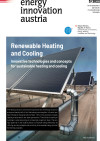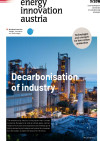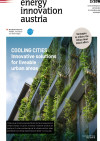Suchergebnisse für "Factsheet: Energietechnologien gestalten, die für alle sinnvoll und nutzbar sind"
CELL4LIFE - Reversible SOCs as a link between electricity, heat and gas networks to increase the self-sufficiency and resilience of neighbourhoods
A system consisting of a solid oxide fuel cell and a Machine Learning-based control system for increasing efficiency and minimizing degradation is being developed. As a link between all energy supply networks, the system is intended to increase the self-sufficiency and resilience of plus-energy districts.
Renewable Heating and Cooling

Innovative technologies and concepts for sustainable heating and cooling
energy innovation austria
3/2022
Herausgeber: BMK in cooperation with the Climate and Energy Fund
Englisch, 12 Seiten
Downloads zur Publikation
Decarbonisation of industry

Ways to achieve a zero-emission industry. Innovation is the key for climate-friendly production.
energy innovation austria
3/2019
Herausgeber: BMVIT und Klima- und Energiefonds
Englisch, 12 Seiten
Downloads zur Publikation
Cooling Citites

Innovative solutions for liveable urban areas
energy innovation austria
2/2019
Herausgeber: BMVIT und Klima- und Energiefonds
Englisch, 12 Seiten
Downloads zur Publikation
IEA Bioenergy Task "Biomass Combustion and Co-firing"
Obtaining, preparation and circulation of information about international evolutions in the biomass combustion field and -co combustion, collaboration at and management of task emphases
GREeNvaluation - Real-time monitoring and performance evaluation
The aim of the project was the development of the GREeNvaluation toolkit, as a precursor to the implementation of green and liveable cities. The visualization and accounting (cost / benefit) of green infrastructure services makes the benefits more tangible and understandable. The GREeNvaluation toolkit aims to create awareness far beyond the target areas by means of target group-specific communication formats.
Living and Working in the Moosburg, the "community of education"
The design aims not only at creating comfortable living spaces and practical work environments, but at connecting these realms, thus providing a holistically attractive “living space”. A pilot project will be built on an appropriate site in the very core of Moosburg, neighbouring both the village square and the educational campus.
ProKlim+ - Use of Model Predictive Control to optimize solar power consumption in case of increased energy efficiency.
Using weather forecast for building automation can help improving the energy efficiency of buildings and, thus, saving energy. In the project ProKlim+ the forecast of solar radiation will be used to optimize the building automation to satisfy the needs of the building users, and at the same time to minimize the energy demand on the one hand and to maximize the consumption of self-produced energy on the other hand.
Gründerzeit with future - demonstration project 1: David´s Corner
High value energy efficient refurbishment of an ensemble of three neighbouring Wilhelminian style buildings in a non-lucrative location.
CombiSol: solar combisystems for houses, state-of-the-art and potentials for improvements
Evaluation of the quality and efficiency of state-of-the-art installed solar combisystems, potentials for improvements and measures to increase the quality
IEA Bioenergy Task 33: Gasification of Biomass and Waste (Working Period 2019 - 2021)
The main aim of IEA Bioenergy Task 33 is the international as well as national information exchange and networking on thermochemical gasification of biomass and waste. The focus is on exchange of information regarding R&D programmes in area of biomass and waste materials gasification, commercial facilities and the marketing chance for gasification facilities to identify and avoid technical and non-technical hurdles.
IEA FBC Implementing Agreement Fluidized Bed Conversion (working period 2009 - 2013)
Overview of the current status of the fluidized bed technology worldwide in regards to energy technology.
IEA PVPS Task 12: Photovoltaics (PV) Sustainability Activities (working period 2024 - 2027)
Photovoltaics (PV) is a renewable energy source that is an important technology for the energy transition. For this reason, or rather despite this, it is important to consider sustainability aspects in PV as well. End-of-life solutions in particular play an important role, as a strong increase in the number of end-of-life modules is expected in the coming years. Well-functioning recycling methods, repair possibilities or reuse options are of great importance. In this project, these existing methods and capacities in Austria are being researched and published in reports and workshops.
Workshop: CO2 Capture and Sequestration (CCS) in Future International R & D Programmes
17. Nov 2004
WKO - Wirtschaftskammer Österreich, Rudolf Sallinger SaalVienna, AT
Initiation of a discussion process concerning the role of CCS in future RTD programmes in general and the presentation of realised (and/or planned) projects in particular as well as challenges of the deployment of CCS technologies.
Innovative system for decentralized CHP on basis of biomass gasification with process optimized production of a low-tar producer gas
Tar loads in the producer gas of CHP-plants based on biomass gasification are reduced by primary measures (staged gasification), whereby the possibilities for application are increased.
Gas cleaning for low tar producer gases from staged biomass gasification
Investigation on gas cooling, on heat management in staged gasification systems, and on gas cleaning from inorganic pollutants, like ammonia and aerosols, of the low-tar producer gas in decentralized staged biomass gasification.
Vilipa - Visible light based Person and Group Detection in existing buildings
Evaluation of the technical and economic feasibility of an occupancy detection system based on the technology of visible light sensing, which, in combination with the building management system, should reduce the energy consumption of buildings. The goal is to implement low-tech/low-complexity solutions that can distinguish between individuals and groups based solely on the detection of visible light reflections.
Best-of "Building of Tomorrow" 2010
22. and 23. November 2010
Skylounge, Austrian Chamber of Commerce (WKO)
Vienna, AT
In the frame of this conference results and ongoing activities of the research programme "Building of Tomorrow" are going to be presented.
Development of modular parts for clay-passive houses

Development of extensive storey-high modular parts made of renewable primary products (wood, straw, hemp) for clay-passive houses.
ESSBAR – Edible balcony gardens for retrofit – Vertical Greening Technologies for the City
Demonstration of an affordable, resource-saving and innovative balcony system with integrated edible vertical gardens and rainwater management. Considering the needs of residents for green outdoor spaces and the active participation of residents are an important part of the project.
